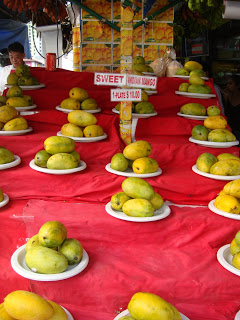 I was bargaining for a thank-you present in Little India for someone who loves on my cats (thank you!) when Chris and I can’t. The guy told me his price, I feigned disinterest.
I was bargaining for a thank-you present in Little India for someone who loves on my cats (thank you!) when Chris and I can’t. The guy told me his price, I feigned disinterest.  I picked out the ones I liked, then walked away. The price came down, I looked at some other wares, then wandered off again. The price came down and down again. “How much you want?” he asked. I named a price. He acted offended. I looked at something else. His price came down. Mine went up. His went down–final offer. I said I’d give him a price in the middle and of course he hesitated briefly to play out his role, then agreed–to less than half his original asking price. I handed over some Singapore dollars and waited for change. He narrowed his eyes and looked at me: “Where are you from?” Now that we weren’t talking money anymore I smiled: “Texas.” He tilted his head to the side while his wife, in a shimmering sage sari, counted out the change. “Good bargain,” he said, handing me the money. “Good bargain.” We saw him again later and he nodded and narrowed his eyes again. “Good bargain!” That was the same reaction from the Spanish scalper I bargained the bullfight tickets from after the fight started.
I picked out the ones I liked, then walked away. The price came down, I looked at some other wares, then wandered off again. The price came down and down again. “How much you want?” he asked. I named a price. He acted offended. I looked at something else. His price came down. Mine went up. His went down–final offer. I said I’d give him a price in the middle and of course he hesitated briefly to play out his role, then agreed–to less than half his original asking price. I handed over some Singapore dollars and waited for change. He narrowed his eyes and looked at me: “Where are you from?” Now that we weren’t talking money anymore I smiled: “Texas.” He tilted his head to the side while his wife, in a shimmering sage sari, counted out the change. “Good bargain,” he said, handing me the money. “Good bargain.” We saw him again later and he nodded and narrowed his eyes again. “Good bargain!” That was the same reaction from the Spanish scalper I bargained the bullfight tickets from after the fight started.  I learned that game in the trenches of bargain warfare: the infamous Cairo Khan! And the point isn’t to be cheap…ok maybe it is a little. But seriously, if you pay full price immediately in a bargaining culture you’re contributing to the mindset that Americans are fat, wasteful rich people who deserve to be taken advantage of. Bargaining is a cultural tradition that establishes mutual respect. True story! Note: This is not the case in Japanese markets, the rare instance where bargaining is socially acceptable on this island. At your local open market you may offer a lower price, which the vendor with usually either immediately accept or decline (with a smile and “no sank yu!”) or occasionally offer a counter offer. In Japan expect none of these endless dating-esque games of disinterest.
I learned that game in the trenches of bargain warfare: the infamous Cairo Khan! And the point isn’t to be cheap…ok maybe it is a little. But seriously, if you pay full price immediately in a bargaining culture you’re contributing to the mindset that Americans are fat, wasteful rich people who deserve to be taken advantage of. Bargaining is a cultural tradition that establishes mutual respect. True story! Note: This is not the case in Japanese markets, the rare instance where bargaining is socially acceptable on this island. At your local open market you may offer a lower price, which the vendor with usually either immediately accept or decline (with a smile and “no sank yu!”) or occasionally offer a counter offer. In Japan expect none of these endless dating-esque games of disinterest. 
